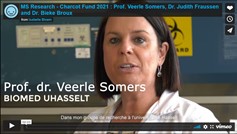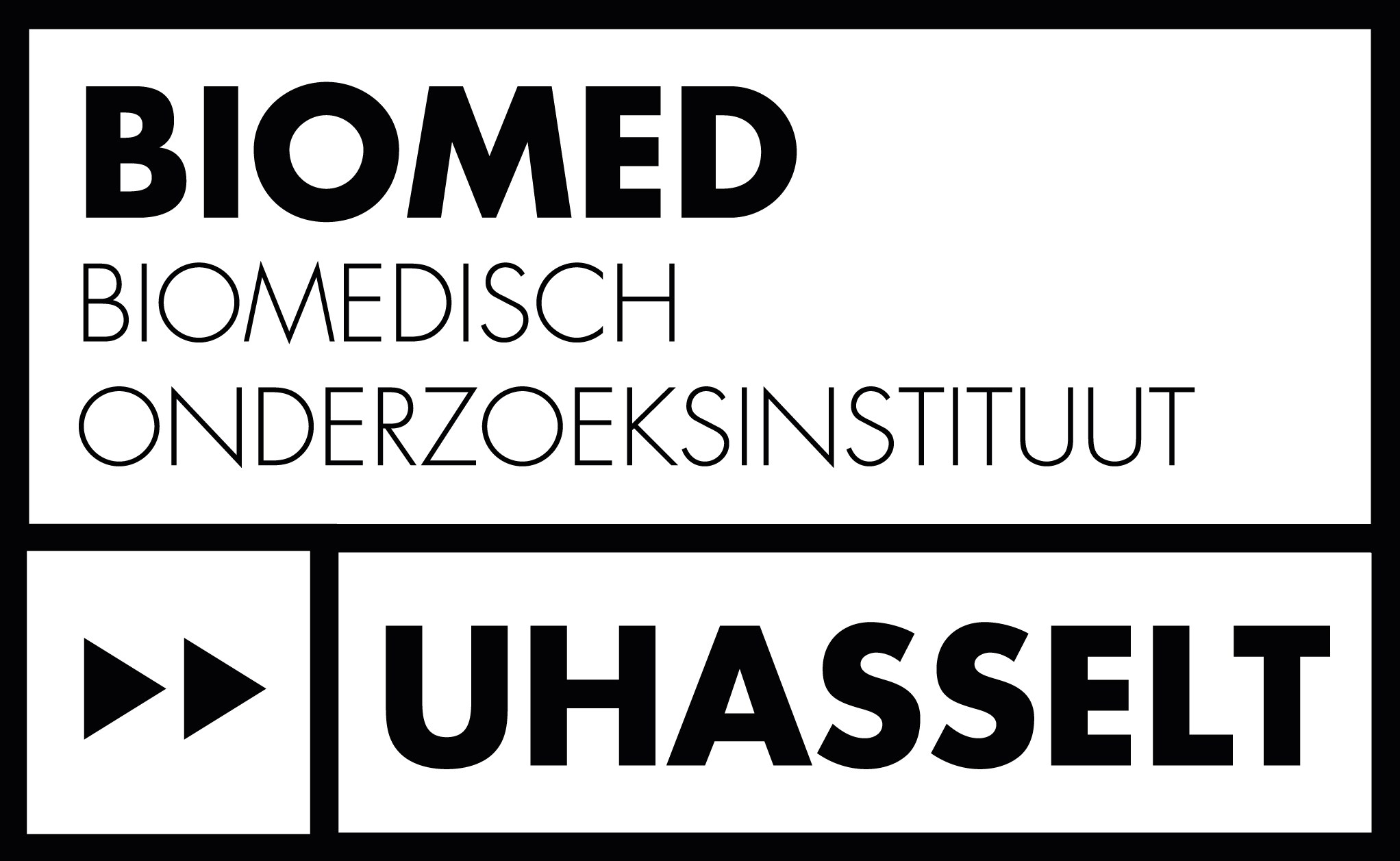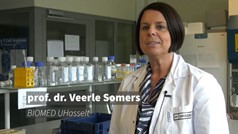Somers-Fraussen Lab
"Antibody biomarker discovery and validation in neurologic and autoimmune diseases.
Pathologic contribution of B cells in autoimmune and neurologic diseases and immune aging."
Prof. dr. Veerle Somers

Autoantibodies
Biomarkers
cDNA phage display
B cell profiling and function
Rheumatoid arthritis
Axial spondyloarthritis
Multiple sclerosis
Spinal cord injury
Autism spectrum disorder
Contact:
+32 (0) 11 26 92 02
veerle.somers@uhasselt.be
Prof. dr. Judith Fraussen

Contact:
+32 (0)11 26 92 70
judith.fraussen@uhasselt.be
Research focus
Research focus
The Somers-Fraussen lab focuses on the discovery and validation of novel autoantibody biomarkers, the characterization of the functional involvement of these autoantibodies and their target antigens, and the study of the pathologic contribution of B cells, for a number of autoimmune and neurologic diseases.
Novel autoantibody biomarkers for neurologic and autoimmune diseases such as rheumatoid arthritis (RA), axial spondyloarthritis (axSpA), multiple sclerosis (MS) and spinal cord injury (SCI) have been identified using cDNA phage display. These autoantibodies are being studied for their role as novel biomarkers for diagnosis, prognosis and therapy prediction, and in addition, their pathological contribution in disease processes is also being studied. With more than a decade of experience in different rheumatic and neurologic disease areas, this has resulted in an optimized pipeline for autoantibody discovery, validation and characterization.
This involves the following steps: (1.) construction of a custom disease- and tissue-specific cDNA phage display library, which forms a highly diverse, in vitro representation of the antigens in the target tissue, (2.) discovery of candidate antigenic targets of novel autoantibodies using cDNA phage display, (3.) initial testing of antibody reactivity of each individual candidate antigen using phage ELISA, (4.) development of a more clinically-applicable peptide/protein ELISA for the best candidate biomarkers and finally, (5.) large scale biomarker validation in multiple cohorts of patients and controls. Moreover, (6.) as the isolated antigens often are randomly formed peptides (mimotopes), the human proteins that are actually targeted by these autoantibodies can be identified via proteomic techniques. Finally, (7.) the functional role of these autoantibodies and their target antigens in contributing to disease pathology is often investigated using cellular models and passive transfer into in vivo animal models of disease.
In addition, the research group studies B cells and B cell subsets in multiple sclerosis (MS), spinal cord injury (SCI) and immune aging. The group is highly expertised in human B cell analysis, both on a phenotypic and functional level. Using high-dimensional flow cytometry, detailed immune profiling and B cell subset phenotypic analysis is done. In this regard, the effect of different immunomodulatory treatments on immune cell distribution and function have been studied in the context of MS. Moreover, the involvement of specific age-associated B cell subsets in MS pathology is studied using in vitro functional assays for B cell activation, maturation, proliferation, survival, antibody production, cytokine production, antigen presentation and migration. In SCI, the contribution of B cell related pathways to secondary neurodegeneration is studied.
Core techniques
Core techniques
- Biomarker discovery in autoimmune and neurologic diseases
- Serological antigen selection
- cDNA phage display using pVI display on filamentous phage
- custom Phage ELISA, peptide ELISA
- Biochemical analysis
- proteomics, 2D gel electrophoresis, mass spectrometry
- gene cloning, protein expression and affinity purification
- custom protein ELISA
- pathologic involvement of autoantibodies and their antigens
- polyclonal antibody purification from human serum
- differentiation of primary cells
- ...
- B cell subsets and functions in neurological diseases
- High-dimensional flow cytometry for human immune profiling
- In vitro models for human B cell function: activation, maturation, proliferation, survival, antibody production, cytokine production, antigen presentation, migration
Team members
Team members
Postdocs
PhD students
Technicians
Key publications
Key publications
- Quaden D, Vandormael P, Ruytinx P, Geusens P, Corten K, Vanhoof J, Liesenborghs J, van Reeth F, Agten A, Vandenabeele F, de Vlam K, Somers V. Antibodies against three novel peptides in early axial spondyloarthritis patients from two independent cohorts. Arthritis Rheumatol 2020; 72(12):2094-2105 (IF 9.002)
- Fraussen J, Marquez S, Takata K, Beckers L, Montes Diaz G, Zografou C, Van Wijmeersch B, Villar LM, O’Connor KC, Kleinstein SH, Somers V. Phenotypic and immunoglobulin repertoire analysis indicate a common origin of IgD-CD27- double negative (DN) B cells in healthy individuals and multiple sclerosis patients. J Immunol 2019; 203(6):1650-1664 (IF 4.34)
- Mazón-Cabrera R, Vandormael P, Somers V. Antigenic Targets of Patient and Maternal Autoantibodies in Autism Spectrum Disorder. Front Immunol 2019; 10:1474 (IF 5.511)
- Montes Diaz G, Fraussen J, Van Wijmeersch B, Hupperts R, Somers V. Dimethyl fumarate induces a persistent change in the composition of the innate and adaptive immune system in multiple sclerosis patients. Sci Rep 2018; 8(1):8194 (IF 4.122)
- Claes N, Fraussen J, Vanheusden M, Hellings N, Stinissen P, Van Wijmeersch B, Hupperts R, Somers V. Age-associated B cells with pro-inflammatory characteristics are expanded in a proportion of multiple sclerosis patients. J Immunol 2016; 197(12):4576-4583 (IF 4.99)
- Fraussen J, Claes N, Van Wijmeersch B, van Horssen J, Stinissen P, Hupperts R, Somers V. B cells of multiple sclerosis patients induce autoreactive proinflammatory T cell responses. Clin Immunol 2016; 173:124-132 (IF 4.034)
- Palmers I, Ydens E, Put E, Depreitere B, Bongers-Janssen H, Pickkers P, Hendrix S, Somers V. Antibody profiling identifies novel antigenic targets in spinal cord injury patients. J Neuroinflammation 2016; 13(1):243 (IF 4.667)
- De Winter LM, Hansen WL, van Steenbergen HW, Geusens P, Lenaerts J, Somers K, Stinissen P, van der Helm-van Mil AH, Somers V. Autoantibodies to two novel peptides in seronegative and early rheumatoid arthritis. Rheumatology 2016; 55(8):1431-6 (IF 4.475)
- de Bock L, Somers K, Fraussen J, Hendriks JJA, van Horssen J, Rouwette M, Hellings N, Villar LM, Álvarez-Cermeño JC, Espiño M, Hupperts R, Jongen P, Damoiseaux J, Verbeek MM, De Deyn PP, D’hooghe M, Van Wijmeersch B, Stinissen P, Somers V. SPAG16 is a novel target of the humoral autoimmune response in multiple sclerosis. J Immunol 2014;193(5):2147-56 (IF 5.52)
- Somers K, Geusens P, Elewaut D, De Keyser F, Rummens JL, Coenen M, Blom M, Stinissen P, Somers V. Novel autoantibody markers for early and seronegative rheumatoid arthritis. J Autoimmun 2011; 36(1):33-46 (IF 8.1)

 Immuunveranderingen na ocrelizumabbehandeling bij MS-patiënten
Immuunveranderingen na ocrelizumabbehandeling bij MS-patiënten
 Erfenis van 2 miljoen euro voor BIOMED onderzoek
Erfenis van 2 miljoen euro voor BIOMED onderzoek

